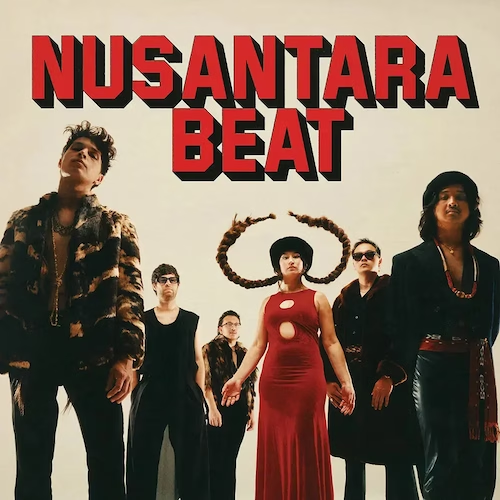Amsterdam’s music scene consistently punches above its weight in retro-inspired global sounds. Nusantara Beat’s self-titled debut album reinforces that reputation. Emerging from Amsterdam’s fertile psych-funk scene, the Indonesian-Dutch ensemble—including members from EUT, Jungle by Night, and Altin Gün—blends surf guitars, hypnotic percussion, and shimmering folk textures into music that feels both reverent and vibrantly alive.
As its title suggests, Nusantara Beat celebrates unity through rhythm. “Nusantara,” meaning all the islands of Indonesia, is reflected in the album’s dense, interwoven sound, conveying a strong sense of togetherness. Across 11 tracks, the group pay homage to the Sundanese musical tradition and the gamelan scale pelog, layering these ancient tonalities beneath modern synths, deep bass grooves, and a cinematic sense of cool.
There’s no shortage of acts drawing on 60s-inspired psychedelia these days, but Nusantara Beat stands out from the rest. Where bands like Khruangbin often drift toward mood music, this collective drives forward with momentum. There’s propulsion here, the kind that invites you to move rather than zone out. Much of that energy comes from the interplay between bassist Michael Joshua and drummer Sonny Groeneveld, whose tight, playful chemistry powers even the record’s most atmospheric stretches.
The opener, “Ke Masa Lalu,” sets the tone with spy-thriller guitars and an otherworldly wash of keys. It’s a perfect encapsulation of the band’s aesthetic—part surf rock, part mystic séance. Tracks like “Bakar” venture further into nocturnal electro, its driving groove and luxuriant synth textures evoking the hum of neon lights reflecting off tropical rain. Elsewhere, “Di Pantai” drifts into balmy funk-soul, the kind of tune that conjures visions of a beach at dusk, cocktails in hand, the horizon flickering between sunset and dream.
Vocalist Megan de Klerk proves to be the group’s not-so-secret weapon. Singing in Indonesian for the first time, her voice glides between tenderness and tension, grounding the music’s heady textures with a deeply human touch. On the fiery single “Tamat,” her delivery cuts through the rhythmic fireworks — Sonny’s spitfire drums and Gino Groeneveld’s tactile percussion – with striking control. It’s a track that could easily light up any dance floor without losing its mystique.
The album’s emotional core arrives on the closer “Cinta Itu Menyakitkan.” After the swirling intensity of what comes before, the band pull things back for a tender finale. It’s a love-lorn ballad. Soft piano and the twinkling notes of a kecapi zither frame the melody, while Megan’s wistful croon adds a romantic, slightly melodramatic touch. The result is utterly gorgeous.
Lyrically, much of the record explores the bittersweet complexities of modern love. But even when you don’t speak the language, the emotional clarity cuts through. Then there’s “Kalankang,” a standout moment that delves into folklore. Ghostly visions unfold over eerie guitar tremors and off-kilter rhythm. It’s weird in all the right ways—a reminder that this band isn’t just looking backwards but exploring the uncanny spaces in between.
Nusantara Beat is funky and arresting, but its esoteric edge is what keeps things interesting. The record is steeped in history yet brimming with modern vitality. It’s a debut that feels both studied and spontaneous. Another welcome addition to Amsterdam’s ever-expanding global groove scene.

